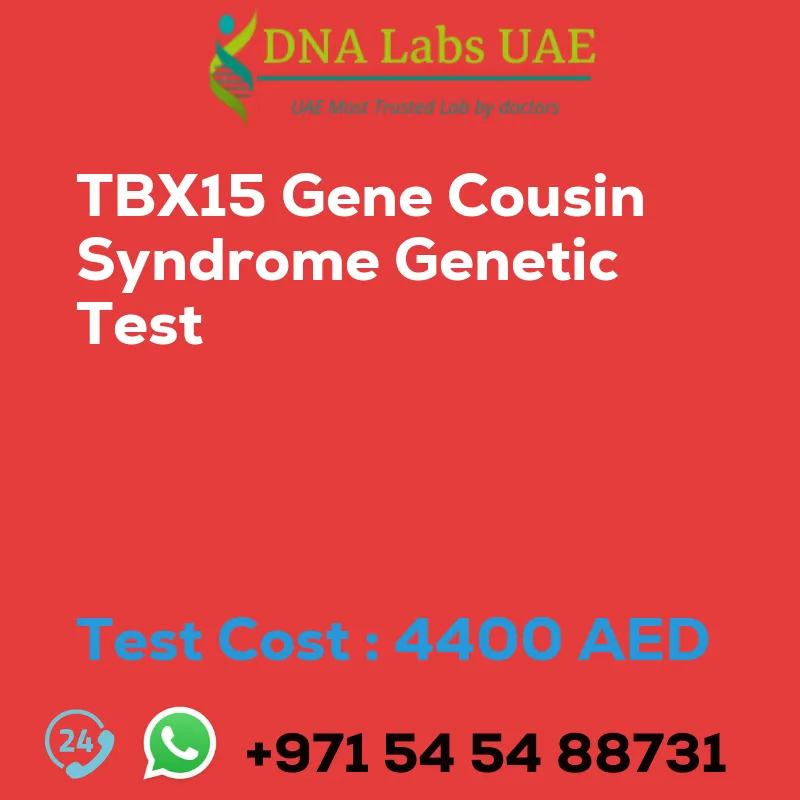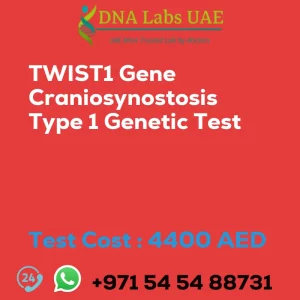TBX15 Gene Cousin Syndrome Genetic Test
About the Test
The TBX15 Gene Cousin Syndrome Genetic Test is a specialized genetic test offered by DNA Labs UAE. This test aims to identify mutations in the TBX15 gene, which is responsible for causing TBX15 Gene Cousin Syndrome. The syndrome is a rare genetic disorder characterized by abnormalities in skeletal development, such as short stature, limb abnormalities, and fusion of bones in the hands and feet.
Test Components and Price
- Test Name: TBX15 Gene Cousin Syndrome Genetic Test
- Components: NGS Technology
- Price: 4400.0 AED
- Sample Condition: Blood or Extracted DNA or One drop Blood on FTA Card
- Report Delivery: 3 to 4 Weeks
- Test Type: Dysmorphology
- Doctor: Pediatrics
- Test Department: Genetics
Pre-Test Information
Prior to undergoing the TBX15 Gene Cousin Syndrome Genetic Test, it is important to provide the clinical history of the patient. Additionally, a genetic counseling session may be conducted to draw a pedigree chart of family members affected by TBX15 Gene Cousin Syndrome.
Test Details
NGS (Next-Generation Sequencing) genetic testing is utilized in this test. This advanced sequencing technology allows for the simultaneous analysis of multiple genes. In the case of TBX15 Gene Cousin Syndrome, NGS genetic testing helps identify mutations in the TBX15 gene, confirming a diagnosis of the syndrome.
The test involves obtaining a DNA sample, typically through a blood sample or cheek swab. The DNA is then sequenced to identify any mutations or variations in the TBX15 gene. This comprehensive test provides a definitive diagnosis for individuals suspected of having TBX15 Gene Cousin Syndrome.
Benefits of Genetic Testing
Genetic testing can be highly beneficial in various ways:
- Provides a diagnosis for individuals with suspected TBX15 Gene Cousin Syndrome
- Guides treatment decisions
- Informs family planning decisions
- Enhances understanding of the underlying genetic mechanisms of the disorder
- Potentially aids in the development of targeted therapies in the future
Consultation and Considerations
Before undergoing any genetic testing procedure, it is crucial to consult with a healthcare professional or genetic counselor. They can provide detailed information about the benefits, limitations, and implications of genetic testing. This ensures that individuals make informed decisions regarding their healthcare.
| Test Name | TBX15 Gene Cousin syndrome Genetic Test |
|---|---|
| Components | |
| Price | 4400.0 AED |
| Sample Condition | Blood or Extracted DNA or One drop Blood on FTA Card |
| Report Delivery | 3 to 4 Weeks |
| Method | NGS Technology |
| Test type | Dysmorphology |
| Doctor | Pediatrics |
| Test Department: | Genetics |
| Pre Test Information | Clinical History of Patient who is going for TBX15 Gene Cousin syndrome NGS Genetic DNA Test. A Genetic Counselling session to draw a pedigree chart of family members affected with TBX15 Gene Cousin syndrome NGS Genetic DNA Test gene TBX15 |
| Test Details |
TBX15 gene cousin syndrome is a rare genetic disorder characterized by abnormalities in skeletal development, such as short stature, limb abnormalities, and fusion of bones in the hands and feet. It is caused by mutations in the TBX15 gene, which plays a role in the development of the skeleton. NGS (Next-Generation Sequencing) genetic testing is a type of genetic test that uses advanced sequencing technologies to analyze multiple genes simultaneously. It can be used to identify mutations in the TBX15 gene and confirm a diagnosis of TBX15 gene cousin syndrome. NGS genetic testing involves obtaining a DNA sample, usually through a blood sample or cheek swab, and then sequencing the DNA to identify any mutations or variations in the TBX15 gene. This test can provide a definitive diagnosis for individuals suspected of having TBX15 gene cousin syndrome. Genetic testing can be useful in providing a diagnosis, guiding treatment decisions, and informing family planning decisions. It can also help in understanding the underlying genetic mechanisms of the disorder and potentially developing targeted therapies in the future. It is important to consult with a healthcare professional or a genetic counselor to discuss the benefits, limitations, and implications of genetic testing before undergoing any testing procedure. |








